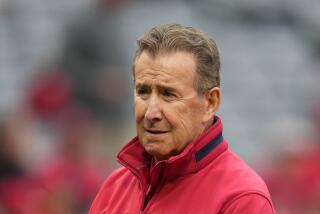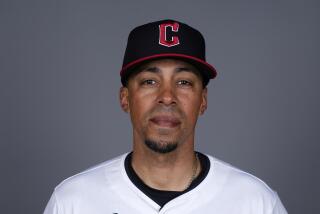Gene Mauch, 79; Manager of Angels, Other Major League Baseball Teams
Gene Mauch, who in a 26-year career managed and won more major-league baseball games than anyone to have never reached a World Series, including two near-misses with the then-California Angels, died Monday of lung cancer. He was 79.
Mauch, a heavy smoker, died at 3:45 p.m. at Eisenhower Medical Center in Rancho Mirage.
After playing for six teams in nine seasons, Mauch began a managerial career that would become as notable for its wrenching failures as for its innovations and longevity.
He began with the Philadelphia Phillies in 1960, and continued with the Montreal Expos, Minnesota Twins and, in two stints in the 1980s, the Angels.
He managed three teams -- the 1964 Philadelphia Phillies and the 1982 and 1986 Angels -- to the brink of the World Series, only to fall agonizingly short. The Phillies lost 10 consecutive games in the final two weeks of the season, and ultimately the National League pennant to the St. Louis Cardinals by one game.
Both Angel teams needed to win once in the final three games of their American League championship series, and did not. The second championship series came down to a strike, a Donnie Moore forkball and a Dave Henderson home run in Game 5.
For an organization that spoke frequently of reaching the World Series for its owner, cowboy actor and singer Gene Autry, the 1986 collapse against the Boston Red Sox defined it until 2002, when the Angels won their first World Series. Autry had died four years earlier, and Mauch had retired before the start of the 1988 season.
“I wanted to win one for the Cowboy more than anybody except his family and at least as much as anybody in his family,” Mauch told The Times in 2002. “Maybe I wanted to win for the Cowboy too much. So am I happy right now? Damn right I am.”
The Angels had hoped to have Mauch throw out a ceremonial first pitch during the 2002 postseason, but Mauch declined. Angel Vice President Tim Mead said it was “because he didn’t want to risk some karma thing.”
“I wish he could have heard the roar of the crowd one more time,” Mead said. “He was a major part of this club, and he was the one who got us as close as we’d ever been.”
Mauch ranks sixth in major-league history in games managed (3,938) and 11th in wins (1,901). His .533 (379-332) winning percentage is the best in Angel history. He was National League Manager of the Year three times and the NL’s All-Star manager in 1965.
A keen baseball strategist, Mauch’s reputation was for playing for one run, a baseball tactic known as “little ball,” and for making use of squeeze bunts and the hit-and-run. He was among the first to manage to batter-pitcher matchups, playing hitters because of their past success against particular pitchers long before the detailed statistical analyses used in today’s game were available.
“He did it before you had ... people paying $60,000 for computer printouts,” said Geoff Zahn, who pitched five seasons for the Angels. “Gene just pored over box scores.”
As for “little ball,” Zahn said, “The little ball we played was with [light hitters Tim] Foli and [Bob] Boone. It wasn’t playing little ball with Don Baylor and Reggie Jackson.”
Mauch, whose authoritarian manner and quick temper earned him the nickname “the Little General,” demanded efficiency. He often arrived at the ballpark long before the players and coaches, immediately put on his uniform and spent the afternoon searching his notes and statistics for an advantage.
Though some players found it difficult to engage or understand Mauch, it was clear that he touched more than a few; 19 of Mauch’s former players -- including Felipe Alou and Don Baylor -- eventually became managers.
And Mauch revived poor teams everywhere he went. In his first full seasons as manager, Mauch improved the Phillies by 34 games, the Expos by 21, the Twins by eight and the Angels by 20.
“He was the best baseball manager -- the best baseball man -- I’ve ever been around, without a doubt,” said Marcel Lachemann, who was Mauch’s pitching coach and later managed the Angels. “The guy was supposed to be such a tough, hard guy, but he had the biggest heart. He really cared about people.”
Said Zahn: “Gene had a tough time opening up to his players. But he loved the players that he had. He had a heart of gold. A lot of guys misread him. He could be hard to play for. He was extremely intense.”
Buck Rodgers, who managed the Angels during four seasons in the early 1990s, said, “He was a fine manager and a fine person. He was an innovative manager. He had the intestinal fortitude to do the things a lot of people didn’t.”
It was Mauch’s conviction that led to what many believed to be his signature events as a manager. He started pitchers on short rest in the final weeks of 1964, leading to the collapse of the Phillies. And Angel fans still debate the merit of Mauch’s replacing starter Mike Witt in the ninth inning against the Red Sox, despite clear signs of Witt’s weariness. He eventually brought in Moore, who surrendered a go-ahead home run to Henderson. The Angels lost in 11 innings, then lost twice more in Boston.
Mauch carried on, and many in baseball consider him one of the great baseball minds ever.
“If they were to hold a managerial clinic, and just have the managers there, I would say Gene Mauch should run the clinic,” former manager Dick Williams once said of Mauch. “That’s how good a manager he was.”
Besides, Mauch once said, the failures were not without their lessons.
“If it’s true you learn from adversity,” he said, “then I must be the smartest SOB in the world.”
Mauch was born in Salina, Kan., on Nov. 18, 1925, and moved with his family to Los Angeles when he was 12. He attended Fremont High School, where he was an All-City infielder. He was signed by the Brooklyn Dodgers in 1943 and was the Dodgers’ Opening Day shortstop in 1944.
He is survived by his wife, Jodie, and daughter Leeanne.
Funeral services are pending.
Times staff writer Bill Shaikin contributed to this story.
More to Read
Go beyond the scoreboard
Get the latest on L.A.'s teams in the daily Sports Report newsletter.
You may occasionally receive promotional content from the Los Angeles Times.






